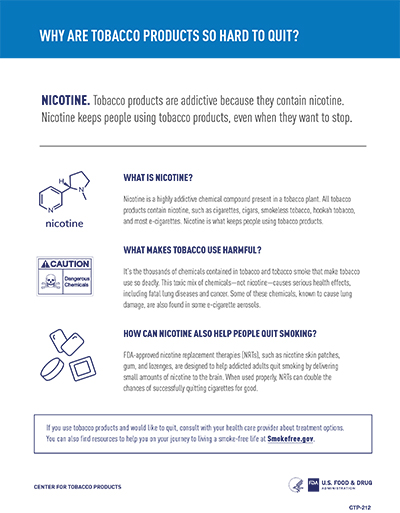5/28/2023
Why Quitting Smoking is Hard and How to Make it Easier

Why Quitting Smoking is Hard and How to Make it Easier
Every smoker, no matter how heavy or light, often faces the dilemma of how to quit smoking. Do you know the saying that old habits die hard? Well, it's ten times harder for smokers to kick the bud. Nicotine is addictive to the extent that quitting almost feels herculean. Most ex-smokers admit that it was the hardest thing they ever did. But they also believe they felt healthier in just 24 hours of stubbing their last cigarette.
Just two hours after quitting, heart rates return to normal. Twelve hours later, carbon monoxide levels in your blood normalise, and within two weeks, lung function improves. So you are not wrong if you see the struggles of quitting smoking but looking at the larger picture, there is much to gain in getting over your dependence on cigarettes. 
Source : https://www.fda.gov/tobacco-products/health-effects-tobacco-use/nicotine-why-tobacco-products-are-addictive
Why Quitting Smoking Is Hard
Smoking is easy. Quitting is hard. Following the American Lung Association's three-link chain method can help make quitting struggles easier.
- Physical
Cigarette smoking has a direct physical impact on a smoker. The release of nicotine triggers the brain to release a naturally occurring chemical- Dopamine. A feel-good hormone, Dopamine, brings instant gratification to the smoker but brings a crash in its wake. When the so-called buzz wears off, you crave another cigarette, and the cycle continues.
Help from medical professionals and NRT can reduce physical nicotine dependence. Nicotine gums like RYZE make quitting smoking easier than going cold turkey. Consult your healthcare provider before starting any NRT product and to find the appropriate quitting tools for you.
The act of lighting a cigarette is so enmeshed in a smoker's routine that quitting takes a toll on the quitters' mental health. Specific times of the day, certain rituals, and some people just trigger the urge to light up a smoke. For instance, when you have your first cup of morning tea, after a heavy meal, or when you are stressed about work.
Quitting breaks that flow of routine. Consider identifying the triggers and bring in clever and creative distractions for yourself. Adjusting your behavioural patterns is one way to ease the quitting process. But more on that later.
- Social
Most people begin smoking in a social setting as it is wrongfully perceived as cool. From sneaking out between classes to taking smoking breaks with coworkers, smoking is often used as an icebreaker to fit within circles. 'Got a light?'- is that typical sentence that gets the ball rolling in any situation.
Developing a social smoking circle increases your intake of cigarettes. Fact. But having a social support group to help quit smoking is also very helpful. Rather than quitting secretly, ask your loved ones for help. You will be surprised how a supportive shoulder and a patient, listening ear will ease your quitting process.
How To Recover From Smoking Withdrawals Easily
Every day when you choose to remain smoke-free, it's a victory. These small accomplishments add up to a big achievement: your health. But ek last cigarette ka mann hota hai?
Your rough patch is the urge to smoke one more cigarette after you quit. Here are some tips for waning off your withdrawal symptoms:
- Cravings are at an all-time peak within the first few days of quitting smoking. To distract your mind from giving in to urges, spending time in no-smoking areas helps to recover from smoking withdrawals easily. Spend a day at the mall with your family. Or take your parents to a smoke-free restaurant for dinner.
- Stress is the number one cause of relapse among smokers. Keep yourself hydrated and eat clean. This will provide you with extra energy to handle stressful situations and prevent tough withdrawal from smoking.
- Avoid triggering beverages like tea, coffee, and alcohol. They are often routined cues to light a cigarette. Replace them with healthier alternatives like a glass of fresh juice, ginger lemon tea, or fruit-infused water.
- Immediately after quitting, you will crave the physical act of holding a cigarette. Use a fidget spinner to keep your hands occupied. A pen, pencil, or even a coin to play with will distract the urge to smoke and help to handle withdrawal easily.
- When you miss the hand-to-mouth association of smoking, chew on a toothpick. Sugar-free nicotine gums like RYZE are also a great way to distract cravings and gradually wane nicotine intake. Consult your doctor before starting any NRT product.
- Deep breathing helps calm the mind, especially when you hang out with smoker friends. Remind yourself why you quit smoking and stick to your decision.
- Every time you feel the urge to smoke, go for a walk. Nature has healing powers, and you'll be surprised at how rejuvenated you will feel after. You can call a loved one while walking to keep yourself distracted. Plus, it will help you avoid the weight gain that is associated with quitting smoking.
- Keep munching but mindfully. With your mouth busy chomping on healthy nuts, fruits, and salads and your body fueled with energy, getting through the day is easy.
- If smoking after a meal was a routine, try brushing your teeth instead. The cool minty freshness will subside cravings for a smoke.
- Reward yourself for your efforts. If you stay smoke-free for a week, use the money saved to treat yourself. It will keep you motivated. Quitting smoking Improves Finances too.
Stay Smoke-Free
Are you thinking of reaching for a cigarette? Reach out for support instead. The first few weeks of quitting are hard. But you'll notice things get better as more time passes. Do remind yourself that you are working towards a smoke-free future, and it is worth the effort!